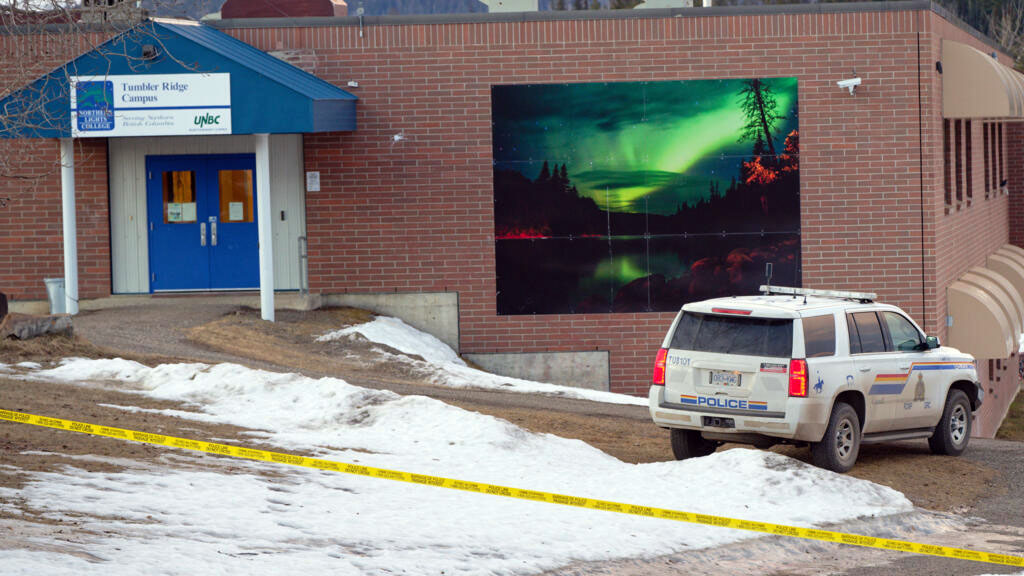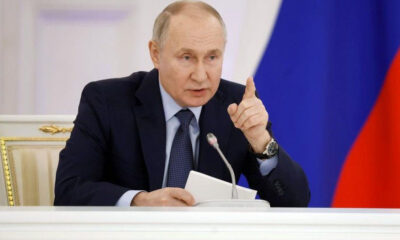International
If Putin uses chemical weapons in Ukraine it’s a ‘game changer’ for NATO

-
Western officials and strategists say that there are good reasons to fear Moscow using unconventional and outlawed weapons.
-
President Joe Biden warned Friday that there would be a “severe price” to pay if Russia used chemical weapons in Ukraine.
-
NATO Secretary-General Jens Stoltenberg said Sunday that such a move would be a war crime.
There are increasing concerns that Russia could be prepared to use chemical weapons to attack Ukraine, with Western officials and strategists warning the threat posed by Moscow and Russian President Vladimir Putin in this regard is credible and serious.
In the last week, Russia itself has accused Ukraine of operating chemical and biological weapons laboratories backed by the U.S. The claims were roundly rebuffed by Ukrainian and Western officials, with the U.S. describing them as “outright lies.” But they have caused alarm nonetheless, with many officials seeing them as Russia inventing and building a false narrative and pretext for using its own chemical weapons against Ukraine, a prospect described as “horrific” by the U.S.
“Russia has a track record of accusing the West of the very crimes that Russia itself is perpetrating. These tactics are an obvious ploy by Russia to try to justify further premeditated, unprovoked, and unjustified attacks on Ukraine,” State Department Spokesperson Ned Price said in a statement last week.
“The United States does not own or operate any chemical or biological laboratories in Ukraine … It is Russia that has active chemical and biological weapons programs and is in violation of the Chemical Weapons Convention and Biological Weapons Convention,” he added.
President Joe Biden warned Friday that there would be a “severe price” to pay if Russia used chemical weapons in Ukraine and NATO Secretary-General Jens Stoltenberg said Sunday that such a move would be a war crime.
“Now that these false claims have been made, we must remain vigilant because it is possible that Russia itself could plan chemical weapons operations under this fabrication of lies,” Stoltenberg told the German newspaper Welt am Sonntag.
READ ALSO:
- Scarcity of aviation fuel: We’ve only 3 days to shut down operations – Airlines
- 14-Year-Old Nanny Strangles Mistress’ Six-Month-Old Baby In Lagos
- Kwara Hijab Crisis: 151 Students May Miss WAEC, Principal Tells Panel
CNBC has contacted Russia’s foreign ministry for a response to the U.S. and NATO’s comments.
‘Game changer’
While the West has been united in its condemnation of Russia’s invasion of Ukraine, with the U.K. describing Putin’s regime as “barbaric,” just how far the U.S. and its NATO allies are willing to go to support Ukraine, and stop Russia, is a moot point. NATO has repeatedly ruled out any kind of military support, such as a no-fly zone pleaded for by Ukraine, that could lead it into a direct confrontation with nuclear power Russia.
But Poland’s President Andrzej Duda said in an interview Sunday that the use of chemical weapons in Ukraine by Russia could change the West’s calculus over the conflict.
“Of course, everybody hopes that he would not dare do that but … if he uses any weapons of mass destruction then this will be a game changer in the whole thing,” he told the BBC’s Sophie Raworth Sunday, adding that NATO would have to “think seriously what to do because then it starts to be dangerous not only for Europe … but the whole world.”
With his almost internationally condemned invasion of Ukraine, which began on Feb. 24, Putin is seen as an increasingly unpredictable leader. With Russia facing far more resistance than it expected to face in Ukraine, and appearing to prepare to attack the capital Kyiv, there are fears that Putin could resort to using unconventional — and outlawed — weapons.
Duda said that Putin had already lost the war politically, and was losing it militarily, and that made the Russian leader dangerous: “If you’re asking me whether Putin can use chemical weapons, I think Putin can use anything right now, especially when he’s in this difficult situation,” he told the BBC.
While fears are heightened that Russia could resort to using chemical weapons in Ukraine, it’s important to remember that there is nothing to suggest their use is imminent.
On Friday, Reuters published a briefing by unnamed Western officials who noted that Russia might use chemical weapons in Ukraine in a “false flag” attack to provide a retrospective justification for its invasion, but there is nothing to suggest a broader use of such weapons in the war.
READ ALSO:
- Minister holds emergency meeting over power outage
- LCC to resume toll operations at Lekki-Ikoyi link bridge April 1
- Explosion: Nigeria’s oil production drops by 25,000 barrels daily
- Panic as DCP Abba Kyari’s wife slumps in court
In the Reuters report, the officials said that “clearly, whilst the Russians are highly likely to have a chemical weapons capability, there is nothing to suggest that they intend to use [them] at this point in a major escalation of the current conflict.”
Nonetheless, Russia has been accused of using chemical weapons before, both on individuals seen as outspoken critics of Putin, and on a wider level was allegedly complicit in their use in the Syrian civil war.
Russia’s reputation
A chemical weapon is defined by the Organisation for the Prohibition of Chemical Weapons as a chemical used to cause intentional death or harm through its toxic properties.
The OPCW’s mission is to implement the provisions of the Chemical Weapons Convention, an arms control treaty signed by 193 countries (including Russia) in 1997 which prohibits the production and use of chemical weapons. It also saw signatories commit to destroying chemical weapons production facilities and stockpiles of such weapons.
Putin said in late 2017 that Russia had completed the destruction of its last chemical weapons (and he chided the U.S. for not yet doing so) but the poisoning of former Russian spy (and double agent) Sergei Skripal and his daughter Yulia in the U.K. in 2018 with a Novichok nerve agent (developed by the Soviet Union) and the poisoning of Putin critic and opposition politician Alexei Navalny in 2020 have suggested Russia has maintained an illicit chemical weapons program.
Russia denied involvement in both incidents despite overwhelming evidence to the contrary.
There have been other cases of chemical weapons attacks in which Russia has been heavily suspected of involvement or at the very least, complicity in their use.
Incidents have included the poisoning in 2004 of Ukraine’s then pro-Western President Viktor Yushchenko with dioxin, and the fatal poisoning of Alexander Litvinenko, a former KGB officer and critic of Putin who died in London after drinking green tea laced with polonium-210, a rare and potent radioactive isotope. A 2016 inquiry found Putin probably approved the killing. The Kremlin denied any involvement in either incident.
Then, when Russian troops fought alongside Bashar Assad’s government forces in Syria’s civil war in which the nerve agent sarin was used against civilians, killing over 1,400 people, Russia was accused of helping Syria to cover up the crime. Russia and Syria denied any use of chemical weapons but the OPCW’s inspectors found undeclared toxins and munitions during site visits and in 2020, the chemical weapons watchdog condemned Syria’s use of banned sarin and chlorine bombs.
When it comes to Ukraine now, we cannot say for sure whether Putin could or will use any kind of chemical weapons. But with Russia’s reputation preceding it, close observers of Putin’s regime suspect that he could have few qualms to deploy the same tactics again, and say the threat is a credible one.
“Are they capable of using low-grade chemical weapons in some form in Ukraine? They are, they did it in Syria. Yes, in a sense, it was through the regime, but I think they could [do it again],” Ian Lesser, vice president of think tank the German Marshall Fund of the United States, told CNBC.
Meanwhile, Wojciech Lorenz, a senior analyst at the International Security Programme at The Polish Institute of International Affairs, told CNBC that “you can never know” what Russia will do, but when it comes to the threat of chemical weapons use, “you have to treat it seriously.”
“Russia has already used chemical weapons on the territory of NATO. They used chemical weapons in Britain, they used chemical weapons to poison and in their attempts to kill Navalny … and it clearly indicates that they have chemical weapons that they should not have because they signed the chemical weapons treaty,” he said.
READ ALSO:
- Child found with dispatch rider not stolen ― Police
- Obaseki replies Wike: We don’t accept political bullies in Edo
- NDLEA traces N4.2bn to Abba Kyari, co-accused’s accounts
Andrew Weber, former assistant secretary of defense for the Obama administration, and who now sits on the nonprofit Council on Strategic Risks, said this weekend that aside from the chemical weapons that have been associated with Russia in past incidents, some kind of biological weapon could be used instead.
“I think we need to take it very seriously, especially given the escalation of the disinformation campaign by Russia,” he told New Zealand Radio’s Morning Report on Saturday. As well as the possible use of chemical weapons, he said Russia could deploy biological weapons in Ukraine which the U.N. defines as disease-causing organisms or toxins disseminated with the intention to harm or kill humans, animals or plants.
“Biological weapons would be different. They might use something like anthrax, for example, which is not contagious and wouldn’t spread back to Russia. But the Russian illegal biological weapons program includes things like plague, tularemia [a rare infectious disease] and even smallpox,” he said.
Both chemical and biological weapons are used to terrorize the opponent, and to cause mass casualties, he said. But he expected a massive response from the West should Russia resort to using them, saying “all bets would be off, there would definitely be a very very strong, united international response to any use of chemical or biological weapons.”
Desperate measures
The danger in the Ukraine conflict, analysts point out, is that Putin might resort to ordering the use of chemical weapons if he feels that the armed forces are not making progress in seizing and occupying Ukraine, particularly as Ukraine’s forces and volunteer fighters mount a staunch resistance and vow to fight to the death.
“I believe strongly that if the Russian forces get bogged down, and they will from time to time, that Putin will authorize the use of chemical weapons. He’s done it before and he’s likely to do it again since he is focused single-mindedly on taking over all of Ukraine and anything that deters or detracts from his ability to do that then he’s going to react accordingly,” retired U.S. Army Colonel Jack Jacobs told CNBC’s Shepard Smith late Friday.
He noted that Russia’s indiscriminate bombing of hospitals and other civilian targets has shown its increasingly uninhibited approach to the war in Ukraine as it seeks to make strides into Ukraine’s territory.
“He’s capable of doing anything as he is single-mindedly focused on one thing and that is taking over Ukraine,” Jacobs said.
CNBC
International
Russia Escalates Digital Control with Attempted WhatsApp Block

Russia Escalates Digital Control with Attempted WhatsApp Block
WhatsApp has accused the Russian government of trying to completely block its messaging service in the country, a move aimed at steering users toward the state-backed app MAX. The Meta-owned platform said the effort, reported on February 12, 2026, threatens over 100 million users and undermines private, encrypted communication in Russia.
In a statement, WhatsApp said: “Today the Russian government attempted to fully block WhatsApp in an effort to drive people to a state-owned surveillance app. Trying to isolate over 100 million users from private and secure communication … can only lead to less safety for people in Russia. We continue to do everything we can to keep users connected.”
READ ALSO:
- Tumbler Ridge Massacre: Canada Investigates Shooter’s Mental Health, Police History
- Ex-Acting AGF Nwabuoku Admits Diverting N868.4 Million to Private Firms
- Kwankwasiyya Urges US Congress to Drop Kwankwaso’s Name from Bill
The attempt is part of a broader crackdown on foreign tech platforms in Russia. Authorities have previously restricted access to Facebook, Instagram, and targeted other services like Telegram. Reports indicate that Roskomnadzor, Russia’s communications regulator, removed WhatsApp from its national internet directory, forcing users to rely on VPNs to access the platform. Critics warn that such measures are designed to expand state surveillance and control over digital communication.
The government is actively promoting MAX, a domestic “super-app” similar to China’s WeChat, which combines messaging with other services. Rights advocates caution that the push toward MAX could compromise privacy protections that platforms like WhatsApp provide. Meanwhile, Kremlin officials have indicated that WhatsApp and other restricted apps could be restored if Meta complies with local data storage and regulatory laws.
WhatsApp’s statement emphasizes that the company will continue to work to keep its service accessible where possible, but the attempted block highlights Russia’s ongoing effort to enforce digital sovereignty and shift users toward state-controlled technology platforms.
Russia Escalates Digital Control with Attempted WhatsApp Block
International
Tumbler Ridge Massacre: Canada Investigates Shooter’s Mental Health, Police History

Tumbler Ridge Massacre: Canada Investigates Shooter’s Mental Health, Police History
Canadian authorities are intensifying investigations into the mental health history and prior police interactions of Jesse Van Rootselaar, the 18-year-old who carried out a deadly mass shooting in the remote mining town of Tumbler Ridge, British Columbia, on February 10, 2026. The tragedy has left the small community in mourning and raised national questions about gun control, mental health support, and law enforcement interventions.
According to RCMP Deputy Commissioner Dwayne McDonald, authorities are still unclear on the motive behind the attack, which is one of the deadliest school shootings in Canadian history. Van Rootselaar, a transgender woman who had dropped out of Tumbler Ridge Secondary School four years ago, first killed her mother and stepbrother before opening fire at the school, where she shot six more victims. The shooter later took her own life at the scene.
Investigators have confirmed that Van Rootselaar was known to police and had previous interactions with the public health system due to mental health concerns. Authorities are reviewing prior incidents, including earlier firearms seizures and her lapsed gun licence, to understand how warning signs were addressed before the massacre. British Columbia Premier David Eby said officials are working with the health system to determine “what interactions may have taken place” in the past.
READ ALSO:
- Ex-Acting AGF Nwabuoku Admits Diverting N868.4 Million to Private Firms
- Kwankwasiyya Urges US Congress to Drop Kwankwaso’s Name from Bill
- Liverpool Edge Sunderland 1-0 to Halt Impressive Home Streak
The victims include a 39-year-old female teacher and five students aged 12 and 13, with one child, 12-year-old Maya Gebala, in critical condition after trying to lock herself and classmates in a library during the attack. First responders arrived within minutes, but the scale of the violence left the tight-knit community of about 2,700 residents reeling. Hundreds gathered for a candlelight vigil to honour those killed and injured.
Prime Minister Mark Carney addressed parliament, describing Tumbler Ridge as a resilient, compassionate community of miners, teachers, and construction workers, and emphasised the need to learn from the tragedy. Flags across Canada have been lowered to half-staff for seven days in remembrance of the victims. Britain’s King Charles and Queen Camilla also expressed shock and sorrow over the massacre.
Schools in the area will remain closed for the remainder of the week as authorities continue their investigation into Van Rootselaar’s mental health background, police interactions, and access to firearms, seeking to understand how similar tragedies can be prevented in the future.
Tumbler Ridge Massacre: Canada Investigates Shooter’s Mental Health, Police History
International
Canada Mass Shooting: Nine Dead in School, Residence Attack

Canada Mass Shooting: Nine Dead in School, Residence Attack
A mass shooting in Tumbler Ridge, British Columbia, Canada has left nine people dead and dozens injured after an attacker opened fire at a secondary school and a nearby residence on Tuesday, February 10, 2026.
According to the Royal Canadian Mounted Police (RCMP), seven victims were killed at Tumbler Ridge Secondary School, while two others died at a residence connected to the incident. At least 27 people were wounded, including two in critical condition, while the rest sustained non-life-threatening injuries.
The suspect was found deceased at the scene from an apparent self-inflicted injury. Authorities have not yet released the identity or motive behind the attack, which has shaken the small community of roughly 2,400 residents.
READ ALSO:
- Police Arrest Suspect as Youth Suffers Head Injury in Vigilante Custody
- Boko Haram Seizes Four Trailers, Rustles Over 100 Cows in Borno
- Wike Backs Tinubu’s Peace Efforts, Vows Stability in Rivers
Police responded rapidly, issuing an active shooter alert, placing schools on lockdown, and evacuating students safely. The RCMP and local officials continue to investigate the circumstances surrounding the attack and the suspect’s background.
Local leaders described the event as a devastating tragedy, expressing solidarity with victims’ families. The shooting has prompted national attention in Canada and renewed calls for enhanced school security and measures to prevent mass shootings.
Authorities have urged the public to remain vigilant and report any suspicious activity, emphasizing the importance of community cooperation in maintaining safety and preventing similar tragedies.
The attack is considered one of the deadliest school-related shootings in Canada in recent years, drawing widespread condemnation and grief across the country.
Canada Mass Shooting: Nine Dead in School, Residence Attack
-

 metro2 days ago
metro2 days agoLeadership Crisis at NAHCON as Chairman Abdullahi Saleh Usman Resigns
-

 News2 days ago
News2 days agoOyo Muslims Reaffirm Loyalty to Sultan on Islamic Matters — Grand Chief Imam
-

 News2 days ago
News2 days agoUS Judge Orders FBI, DEA to Release Tinubu’s Criminal Records, Faults Delays
-

 International2 days ago
International2 days agoUS to Deport 18 More Nigerians on ‘Worst-of-the-Worst’ Criminal List (Full Names)
-

 metro2 days ago
metro2 days agoFormer NAHCON Chief Explains Why He Stepped Down, Denies Conflicts
-

 Business2 days ago
Business2 days agoNaira Posts Strong Comeback, Breaking Two‑Year High Against Dollar
-

 Business3 days ago
Business3 days agoCAC Deploys AI, Partners Google to Tackle Rising Business Registration Demand
-

 metro3 days ago
metro3 days agoCourt of Appeal Affirms Senate’s Power to Suspend Natasha Akpoti















